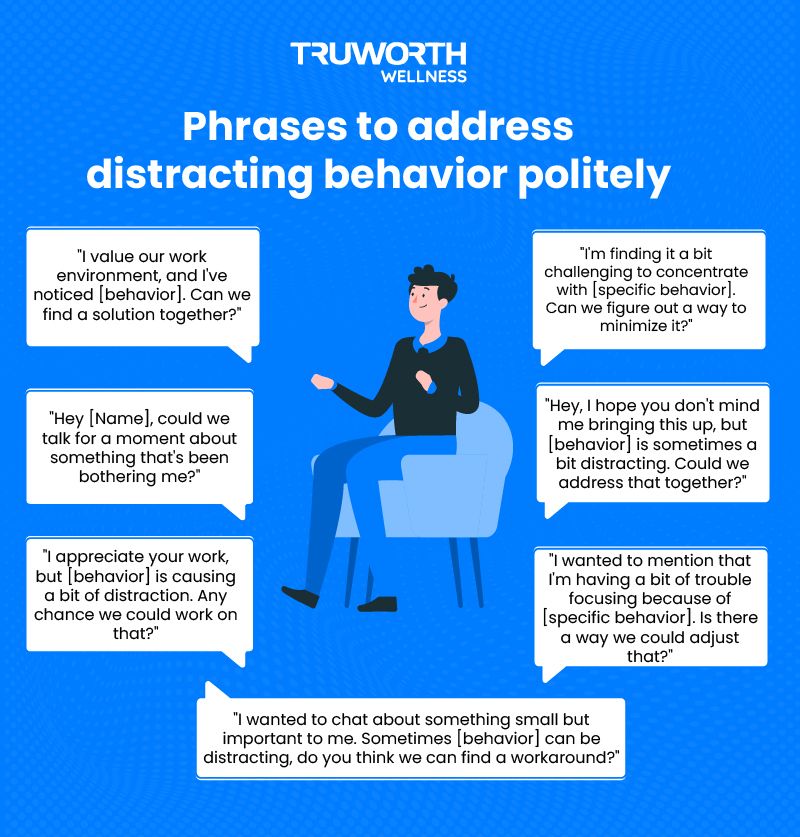Polite Ways To Notify A Colleague About Their Distracting Behaviour

Distractions in the workplace often disrupt our focus and productivity. They come in various forms—continuous notifications, background noise, or interruptions from colleagues—that make it challenging to concentrate. Addressing these distractions, especially when involving a colleague, requires a sensitive approach.
However, fostering open communication and tactful strategies can help mitigate these interruptions and create a more focused work environment.
1) Choose the Right Moment
Selecting an appropriate time for discussion is vital. Look for a calm period, away from high-pressure tasks, ensuring an uninterrupted and productive conversation to foster a more receptive atmosphere.
2) Be Empathetic
Empathy forms the foundation for a constructive conversation. Acknowledge that maintaining focus amidst distractions is a common struggle and express a shared desire to find a mutually beneficial solution, setting a collaborative tone.
3) Communicate Effectively
Effective communication involves not just speaking but also listening and understanding.
- Focus on Specific Behaviors: Instead of making general complaints, pinpoint specific instances causing distractions. For instance, discuss how frequent phone calls during focused work periods disrupt your workflow, making it challenging to maintain productivity.
- Use "I" Statements: Express personal challenges without blaming the colleague. For example, convey, "I find it challenging to concentrate when there's constant background noise," to convey your experience without sounding accusatory.

Highlight the Impact
Clearly state how specific actions or behaviors impact work. Describe how distractions affect your work and potentially impact your colleague.
- Explain the Effects: Highlight potential long-term effects, such as missed deadlines, compromised quality, or strained team dynamics resulting from ongoing distractions. Emphasize that resolving these issues would not only enhance productivity but also create a more conducive work environment for both parties.
- Avoid Blame Game: Maintaining a positive and collaborative tone throughout the conversation is crucial. Focus on exploring solutions together rather than assigning blame, fostering a more supportive and solution-oriented approach.
Must Check: The Art of Saying "No" At Work
Find Solutions Together
Collaboratively finding solutions is a constructive way to address workplace challenges.
- Offer Collaborative Solutions: Brainstorm solutions collaboratively, such as agreeing on designated quiet hours, optimizing shared spaces, or using communication tools effectively. This helps minimize distractions and manage urgent matters more efficiently.
- Encourage Openness: Create an environment where both parties can freely express concerns without fear of judgment. Building trust and openness aids in finding effective solutions together.
Office Politics: Resolving Conflicts/Issues At Work
Maintain a Positive Tone
Use positive and encouraging language to convey your thoughts.
- Acknowledge Progress: Celebrate any small wins and improvements made in reducing distractions. Acknowledging progress helps maintain motivation and keeps the focus on positive outcomes.
- Keep the Mood Light: Ensure the conversation remains friendly and supportive, fostering a constructive and encouraging environment to work on improvements together.
Follow Up
Conclude the conversation on a hopeful note. Determine if adjustments or additional measures are needed to further enhance focus and productivity.
- Check Progress: Periodically assess the effectiveness of implemented solutions and make adjustments if needed to further minimize distractions.
- Revisit Solutions if Needed: If distractions persist, revisit the conversation, reiterate the impact, and brainstorm alternative strategies collaboratively.
EAP (Employee Assistance Program)
Consider discussing the Employee Assistance Program (EAP) if distractions persist or personal issues contribute to the distractions. EAPs offer confidential counseling and support services to help manage stress or work-related challenges affecting performance.
Highlight the benefits of EAP resources, emphasizing confidentiality and professional assistance. Encourage your colleague to seek support if distractions stem from personal or emotional issues impacting their work.
Why Do Companies Invest In EAP Counseling For Their Teams?
FAQs
Q: What if the distractions are coming from multiple sources or colleagues?
A: Consider having a team discussion to collectively agree upon strategies to minimize disruptions during work hours.
Q: How can I politely ask a coworker to lower their voice without offending them?
A: Approach the conversation with empathy and concern for a peaceful work environment, suggesting ways to maintain lower noise levels.
Q: What if I'm the one causing distractions unknowingly?
A: Be open to feedback from colleagues and collaborate to find mutually acceptable solutions to minimize distractions you might be inadvertently causing.
Q: How do I address distractions from personal conversations or socializing without seeming intrusive?
A: Gently emphasize the importance of a productive work environment and suggest designated break times for socializing to respect everyone's focus.
Q: Should I involve our supervisor immediately if distractions persist despite discussions?
A: Consider involving a supervisor after collaborative solutions have been thoroughly attempted but proved ineffective.
Q: How can I encourage colleagues to be more mindful of distractions without singling anyone out?
A: Initiate a team discussion or send a friendly reminder about maintaining a focused work environment using inclusive language.
Conclusion
Handling workplace distractions with colleagues necessitates effective communication, empathy, and a collaborative mindset. By addressing concerns openly, exploring solutions together, considering resources like EAPs, and fostering a supportive work environment, it's possible to create a more conducive and productive workspace for everyone involved.
Share your strategies for handling workplace distractions in the comments! Let's learn from each other and support the creation of more productive and enjoyable workspaces.